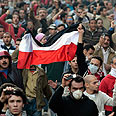
Cairo protest, Friday
צילום: AP
The American dilemma
Op-ed: Obama Administration must decide whether to support democracy or US ally Mubarak
WASHINGTON – The natural American tendency is to support individual freedoms, freedom of religion, freedom of expression and freedom of association, which constitute inalienable US assets and the essence of the American nation. However, democracy at home is one thing, while democracy abroad is an entirely different matter.
In order to preserve its global hegemony, the US over the years knew how to openly endorse democratic reforms in the Arab world and other regions, yet at the same time support tyrants such as Mubarak and the Saudi and Jordanian kings – as long as they were loyal to the US and to the West, of course.
When former President George W. bush attempted to push the Middle East to adopt democracy, in the wake of the Iraq takeover and the toppling of Saddam Hussein, he insisted on holding elections for the Palestinian Legislative Council, contradictory to Israel’s and the Palestinian Authority’s position. Hamas ended up winning most seats in the subsequent vote. Meanwhile, Bush’s democratization ideas in Lebanon opened the door for Hezbollah’s integration into parliament and beyond.
Obama appears to be more pragmatic than his predecessor on this front. He issued statements in favor of democracy, including in the famous Cairo speech, yet at the moment of truth he lowered his profile. The State of the Union Address Tuesday constituted an opportunity to speak about democracy, yet the word “Egypt” was not mentioned in the speech. Tunisia, however, was mentioned.
The latest developments in the Arab world caught the American Administration in a helpless position as it desperately seeks the help of its diplomats, and mostly its intelligence arms, in making sense of where the wind is blowing.
Mubarak ignores US advice
The only thing which Washington can provide the Middle East with at this time is declarations, with officials in Egypt and across the Arab world closely monitoring any nuance uttered by America. Egypt is a strategic anchor of US policy and serves as the basis for supporting the peace process with Israel. The toppling of Mubarak would be far from guaranteeing democracy, yet officials in Washington are concerned that they are late in understanding what’s happening, and that the masses will not forgive the US for failing to stand by them at the moment of truth.
Is this the reason why America has been changing its tone? Secretary of State Clinton and other Administration officials have been displaying their superb rhetorical tricks in recent days, endorsing Mubarak yet also urging him to allow the protests against him to go on. By Friday night, the White House was threatening to reduce foreign aid to Egypt depending on Cairo’s response to the protests.
Earlier, Clinton made it clear that "We support the universal rights of the Egyptian people including the rights to freedom of expression, association and assembly, and we urge the Egyptian authorities not to prevent peaceful protests or block communications, including on social media sites. We believe strongly that the Egyptian government has an important opportunity at this moment in time, to implement political, economic and social reforms to respond to the legitimate needs and interests of the Egyptian people."
Mubarak, by the way, did the exact opposite of the advice he received from his American friends and allies.
- Follow Ynetnews on Facebook










